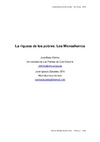Identificador persistente para citar o vincular este elemento:
https://accedacris.ulpgc.es/jspui/handle/10553/58008
| Campo DC | Valor | idioma |
|---|---|---|
| dc.contributor.author | Boza Chirino, José | en_US |
| dc.contributor.author | Zabaleta, Jose Ignacio | en_US |
| dc.date.accessioned | 2019-11-22T09:04:02Z | - |
| dc.date.available | 2019-11-22T09:04:02Z | - |
| dc.date.issued | 2012 | en_US |
| dc.identifier.issn | 2174-3835 | en_US |
| dc.identifier.other | Dialnet | |
| dc.identifier.uri | https://accedacris.ulpgc.es/handle/10553/58008 | - |
| dc.description.abstract | Las personas que no tienen acceso al sistema financiero también ahorran. En este trabajo explicamos las modalidades de ahorros más usadas quienes no acceden a la banca formal. Como veremos, la forma del ahorro varía de una cultura a otra, de un país a otro y de una circunstancia a otra. En la actualidad, emerge a nivel mundial el microahorro o ahorro de pequeñas cantidades de dinero en instituciones de microfinanzas (IMFs), estas instituciones en su mayoría nacieron como Ongs especializadas en la oferta de microcréditos. Entre los objetivos del estudio está el averiguar si, desde el punto de vista financiero, los ahorros de las personas pobres corren diferentes riesgos dependiendo de la IMFs en la que realicen sus depósitos. | en_US |
| dc.description.abstract | People who do not have access to the financial system also saved. In this work we explain the most commonly used forms of savings who have no access to formal banking. As we shall see, the form of savings varies from one culture to another, from one country to another and from one circumstance to another. Currently, global emerging micro-savings or savings of small amounts of money in microfinance institutions (MFIs), these institutions, and most were born like NGOs specialized in the provision of microcredit. Among the objectives of the study is to figure out whether, from a financial standpoint, the savings of poor people are at different risks depending on the MFIs in which they conduct their deposits. | en_US |
| dc.language | spa | en_US |
| dc.relation.ispartof | Atlantic Review of Economics: Revista Atlántica de Economía | en_US |
| dc.source | Atlantic Review of Economics: Revista Atlántica de Economía[ISSN 2174-3835],v. 1 (1), p. 5-20 | en_US |
| dc.subject | 530401 Consumo, ahorro, inversión | en_US |
| dc.subject.other | Microahorro | en_US |
| dc.subject.other | Microsavings | en_US |
| dc.title | La riqueza de los pobres: Los microahorros | en_US |
| dc.type | info:eu-repo/semantics/article | en_US |
| dc.type | Article | en_US |
| dc.identifier.url | http://dialnet.unirioja.es/servlet/articulo?codigo=4736593 | - |
| dc.description.lastpage | 20 | - |
| dc.identifier.issue | 1 | - |
| dc.description.firstpage | 5 | - |
| dc.relation.volume | 1 | - |
| dc.investigacion | Ciencias Sociales y Jurídicas | en_US |
| dc.type2 | Artículo | en_US |
| dc.contributor.authordialnetid | 1751227 | - |
| dc.contributor.authordialnetid | No ID | - |
| dc.identifier.dialnet | 4736593ARTREV | - |
| dc.identifier.ulpgc | Sí | es |
| item.fulltext | Con texto completo | - |
| item.grantfulltext | open | - |
| crisitem.author.dept | GIR TIDES: Economía, medioambiente, sostenibilidad y turismo | - |
| crisitem.author.dept | IU de Turismo y Desarrollo Económico Sostenible | - |
| crisitem.author.orcid | 0000-0002-8494-8864 | - |
| crisitem.author.parentorg | IU de Turismo y Desarrollo Económico Sostenible | - |
| crisitem.author.fullName | Boza Chirino,José | - |
| Colección: | Artículos | |
Visitas
178
actualizado el 15-ene-2026
Descargas
261
actualizado el 15-ene-2026
Google ScholarTM
Verifica
Comparte
Exporta metadatos
Los elementos en ULPGC accedaCRIS están protegidos por derechos de autor con todos los derechos reservados, a menos que se indique lo contrario.
